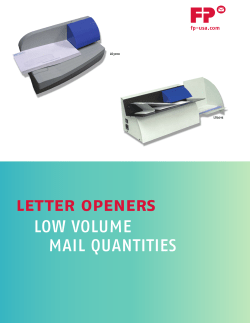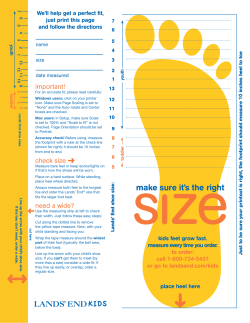
global water footprint standard (wfn) and iso14046
INTERNATIONAL TRAINING IN APPLIED METHODS FOR WATER FOOTPRINT ASSESSMENT: GLOBAL WATER FOOTPRINT STANDARD (WFN) AND ISO14046 Madrid, February 5-6, 2015 Fundación Botín, Castelló 18, Madrid, Spain Background Knowledge dissemination on Water Footprint Assessment (WFA) through delivering training courses worldwide on the global standard for WFA is a core part of WFN’s capacity building programme. The WFN and the Botín Foundation (Spain) co-organize a practical course on the application of the WFA from the perspective of the private sector, including the ISO 14046 standard and its relation to the WFA. The Fundación Premio Arce (of Universidad Politécnica de Madrid) has co-organised previous courses on water footprint in 2011 and 2013 partnering with WFN and Botín Foundation. The course is tailored towards the application of the Water Footprint Assessment from the perspective of the private sector, including specific sessions on the ISO 14046 norm and its relation to the Water Footprint Assessment. The course presents the application of the WFA as a tool for corporate water management and stewardship. It introduces the participants to the design and execution of their own WFA, including all four phases of the assessment from goal and scope definition to accounting, sustainability assessment and response formulation phase. Course details The course covers all aspects of the Water Footprint Assessment and its application. It is delivered in the form of presentations [lectures] with hands-on exercises and case studies. It has enough technical depth to allow practitioners to understand a full WFA, and at the same time it covers most up to date research knowledge in this field. The duration of the course is 2 full-days [Agenda attached]. Number of participants The course is open to 25 participants. Course fees The fees charged to participants will be 600€ for the two day course, including course materials, lunch and coffee breaks. Reduced fees of 100€ will be offered to four students and unemployed persons, reduced fees of 500€ and 400€ will be offered for two or three persons coming from the same organization, respectively. WFN and the BF will deliver the training and issue trainee certificates after successful completion of the full course. Schedule 1st week of February 2015: Thursday 5th – Friday 6th February. Total course duration will be 15 hours, including a minimum 11 of formal teaching, lectures and case studies. Registration Registration is open until the course fills up. Applicants must write an email to Katerina Kucerova (katerina.kucerova@upm.es, +34 914524815). She will provide applicants with all details. Coordination The course is coordinated by Alberto Garrido (CEIGRAM-UPM-FMB), Maite M. Aldaya (UCMFMB-UNEP), and Ruth Mathews (WFN) and Daniel Chico (WFN). Programme Day 1. February 5, 2015 08:45-9:00 Arrival and registration Introduction: 09:00-9:30 - Course objectives and the structure of the course - Expectation exchange among participants - Introduction to the Botín foundation and Water Footprint Network Water Footprint Assessment (WFA), Rationale, methods and applications 9:30-11:00 - Introduction to the Water Footprint, its history, development and uses - Concepts - Water Footprint Assessment and its applications 11:00-11:15 Break Tea - Coffee Javier García Cañete Team of instructors WFN (Guoping,Zhang Daniel Chico) Water Footprint Accounting Theory 11:15-13:30 13:30-14:30 - Accounting for green, blue and grey water footprint - Water footprint accounting exercise - Concept of product fraction and value fraction - Water footprint of a product exercise Lunch Introduction to ISO 14:30-15:30 WFN (Guoping Zhang, Daniel Chico) ISO as an environmental impact assessment tool to complement sustainability assessment BF (A Garrido) Sustainability Assessment Theory 15:30-16:30 16:30-16:45 - Understanding the local context - Sustainability criteria and hotspot identification - Sustainability assessment with respect to green, blue & grey water footprints WFN (Guoping Zhang, Daniel Chico) Coffee Case study summary 16:45-17:15 Summary and analysis of the case studies available, gaps and opportunities, in Spain and beyond Maite Aldaya, BF 17:15-17:45 How to address the water footprint verification Antonio Carretero, AENOR 17:45-18:00 Day Wrap-up Day 2. February 6, 2015 Opening session 09:00-9:30 09:30-10:15 - Review of day’s agenda - Questions or insights from Day 1 Specific challenges for WFA of Agricultural and Food Products BF+WFN BF (to be determined) The notion of evapotranspiration, irrigation efficiency and crops' water demand and management 10:15-10:45 Water footprint linkages with geographical areas P. Martínez-Santos, BF The case of Cantabria 10:45-11:15 Tea-Coffee 11:15-12:15 Developing a project of WF with a view to obtain WFA and ISO 14046 certification Presentation of on-going project towards discussion options, obstacles and ways forward WFN (Guoping Zhang, Daniel Chico) Response Formulation Theory 12:15-13:15 13:15-14:15 - Prioritization based on sustainability assessment - Identifying response strategies - Scope/role of governments, companies, investors, farmers and consumers WFN (Guoping Zhang, Daniel Chico) Lunch Sustainability Assessment and Response formulation Exercise 14:15-15:45 15:45-16:30 - Evaluation of Sustainability hotspots. - Corporate water footprint exercise – part I - Identification of priority basins - Response formulation design. Corporate water footprint exercise – part II WFA Case Study if sugar from sugarcane in a beverage company Case study 16:30-16:50 WFN (Guoping Zhang, Daniel Chico) WFN (Guoping Zhang, Daniel Chico) Tea-Coffee Challenges and the way forward 16:50-17:45 - Panel discussion with instructors, including questions from participants Maite Aldaya, BF+WFN 17:50-18:00 Wrap-up (questions & answers) BF+WFN Instructors and Organizers Javier García Cañete Director of Trends of Observatory of the Botín Foundation Maite M. Aldaya Water Observatory, Botín Foundation and consultant, United Nations Environment Programme Alberto Garrido Water Observatory, Botín Foundation and Professor of Agricultural and Natural Resource Economics (Universidad Politécnica de Madrid) and Researcher at CEIGRAM (UPM) Pedro Martínez-Santos Water Observatory, Botín Foundation and Tenure Lecturer at the Complutense University of Madrid Daniel Chico Project Officer, Water Footprint Network Guoping Zhang Programme Director, Water Footprint Network Antonio Carretero Environmental Manager, AENOR
© Copyright 2025









